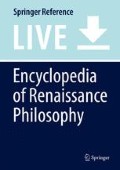Abstract
The “dignity of man” concerns the human condition and what sets humans apart from other creatures on earth and in the heavens. The idea had origins in ancient Greek and Roman literature and later added the biblical story of creation from the Old Testament, which became central to the concept in the Renaissance. A number of literary motifs characterize the “dignity of man” such as the idea that man is a microcosm of the universe, the praise of the human body and its parts including the erect posture of humans with the face looking towards the heavens, and the lists of accomplishments or feats of exemplary men and women. The free will or choice that humans have to “shape” or “determine” their nature becomes the most important aspect of the Renaissance dignity of man and woman for humanists in the 1500s and for later generations of scholars especially after the 1800s.
References
Primary Literature
Agrippa, H.C. 1535. De la noblesse & preexcellence du sexe fœminin. Paris: Denis Janot.
Agrippa, H.C. 1982. Trois livres de la philosophie occulte ou magie, ed. and trans. Jean Servier, 3 vols. Paris: Berg.
Agrippa, H.C. 1992. De occulta philosophia libri tres, ed. V. Perrone Compagni. Leiden: Brill.
Agrippa, H.C. 1996. Declamation on the nobility and preeminence of the female sex, ed. Albert Rabil. Chicago: University of Chicago.
Aristotle. 1907. De anima, ed. R.D. Hicks. Cambridge: Cambridge University Press.
Boaistuau, P. 1982. Bref discours de l’excellence et dignité de l’homme (1558), ed. M. Simonin. Geneva: Droz.
Bovelles, Charles de. 1982. Liber de sapiente / Le livre du sage, ed. P. Magnard. Paris: Vrin.
Champier, S. 1502. La Nef des princes et de batailles de noblesse avec aultres enseignemens utilz et profitables a toutes manieres de gens pour cognoistre bien vivre et mourir. Lyon: Guillaume Balsarin.
de Crenne, H.. 1986. A Renaissance woman: Helisenne’s personal and invective letters, ed. M. Mustacchi and P. Archambault. Syracuse: Syracuse University Press.
Du Bartas, Guillaume de Saluste. 1578. La sepmaine, ou Création du monde. Paris: J. Février.
Ficino, M. 2001–2006. Platonic theology, ed. J. Hankins, et al., 6 vols. Cambridge, MA: Harvard University Press.
Lefranc, Martin. 1530. Le Champion des dames. Paris: Galiot du Pré.
Manetti, G. 1966. On the dignity of man. In Two views of man: Pope Innocent III—On the Misery of Man; Giannozzo Manetti—On the Dignity of Man, trans. and ed. Bernard Murchland. New York: F. Ungar Publishing.
Manetti, G. 2003. Biographical writings, ed. and trans. S. Baldassarri and R. Bagemihl. Cambridge, MA: Harvard University Press.
Manetti, G. 2018. On human worth and excellence, trans. and ed. B. Copenhaver. Cambridge, MA: Harvard University Press, forthcoming.
Ovid. 1986. Metamorphoses, trans. and ed. M. Innes. Harmondsworth: Penguin.
Parmentier, J. 1971. Traicté en forme d’exhortation contenant les merveilles de Dieu et de la dignité de l’homme. In J. Parmentier, Œuvres poétiques (1531), ed. F. Ferrand. Geneva: Droz.
Pico della Mirandola G. 2012. Oration on the dignity of man: A new translation and commentary, ed. Francesco Borghesi, et al. Cambridge: Cambridge University Press.
Pico della Mirandola, G. Progetto Pico/ Pico Project. Brown University and the University of Bologna. http://www.brown.edu/Departments/Italian_Studies/pico/
Scève, M. 1976. Microcosme, ed. E. Guidici. Paris: Vrin.
Secondary Literature
Berriot-Salvadore, E. 1990. Les femmes dans la société française de la Renaissance. Geneva: Droz.
Burckhardt, Jacob. 1958. The civilization of the renaissance in Italy. New York: Harper.
Ferrari, Michel. ed. 2011. Charles de Bovelles’ Liber de Sapiente, or Book of the wise. Special Issue of Intellectual History Review 21 (3): 257–394. https://doi.org/10.1080/17496977.2011.598274.
Kateb, G. 2011. Human dignity. Cambridge, MA: Harvard University Press.
Kraye, J. 1988. Moral philosophy. In The Cambridge history of renaissance philosophy, ed. C. Schmitt and Q. Skinner, 303–386. Cambridge: Cambridge University Press.
Lebech, M., and J. McEvoy. 2009. De dignitaté conditionis humanae: Translation, commentary and reception history of the Dicta Albini (PS.-Alciun) and the Dicta Candidi. Viator 40 (2): 1–34.
Magnard, P. ed. 1995. La Dignité de l’homme: Actes du colloque tenu à la Sorbonne-Paris IV, en novembre 1992. Paris: Champion.
Manetti, G. 2018. On human worth and excellence, ed. Brian Copenhaver. Cambridge, MA: Harvard University Press.
Niederberger. 2015. Esse servitutis omnis impatientem/Man is impatient of all servitude: Human dignity as a path to modernity in Ficino and Pico della Mirandola? The European Legacy 20 (5): 513–526. https://doi.org/10.1080/10848770.2015.1041821.
Patrides, C.A. 1982. With his face towards heaven: The upright form of man. In Premises and Motifs in Renaissance thought and literature. Princeton: Princeton University Press.
Rice, E. 1988. The Renaissance idea of Christian antiquity: Humanist patristic scholarship. In Renaissance humanism: Foundations, forms, and legacy, ed. Albert Rabil Jr., vol. 3. Philadelphia: University of Pennsylvania Press.
Sozzi, L. 1970. La ‘dignitas hominis’ dans la littérature de la Renaissance française. In Humanism in France at the end of the middle ages and in the early renaissance, ed. A.H.T. Levi, 176–198. Manchester: Manchester University Press.
Sozzi, L. 1982. La dignité de l’homme à la Renaissance. Turin: G. Chiappelli.
Warner, L. 2011. The ideas of man and woman in Renaissance France: Print, rhetoric and law. Aldershot/Burlington: Ashgate.
Author information
Authors and Affiliations
Corresponding author
Editor information
Editors and Affiliations
Section Editor information
Rights and permissions
Copyright information
© 2018 Springer International Publishing AG, part of Springer Nature
About this entry
Cite this entry
Warner, L. (2018). Human Dignity in Renaissance Philosophy. In: Sgarbi, M. (eds) Encyclopedia of Renaissance Philosophy. Springer, Cham. https://doi.org/10.1007/978-3-319-02848-4_191-1
Download citation
DOI: https://doi.org/10.1007/978-3-319-02848-4_191-1
Received:
Accepted:
Published:
Publisher Name: Springer, Cham
Print ISBN: 978-3-319-02848-4
Online ISBN: 978-3-319-02848-4
eBook Packages: Springer Reference Religion and PhilosophyReference Module Humanities and Social SciencesReference Module Humanities

